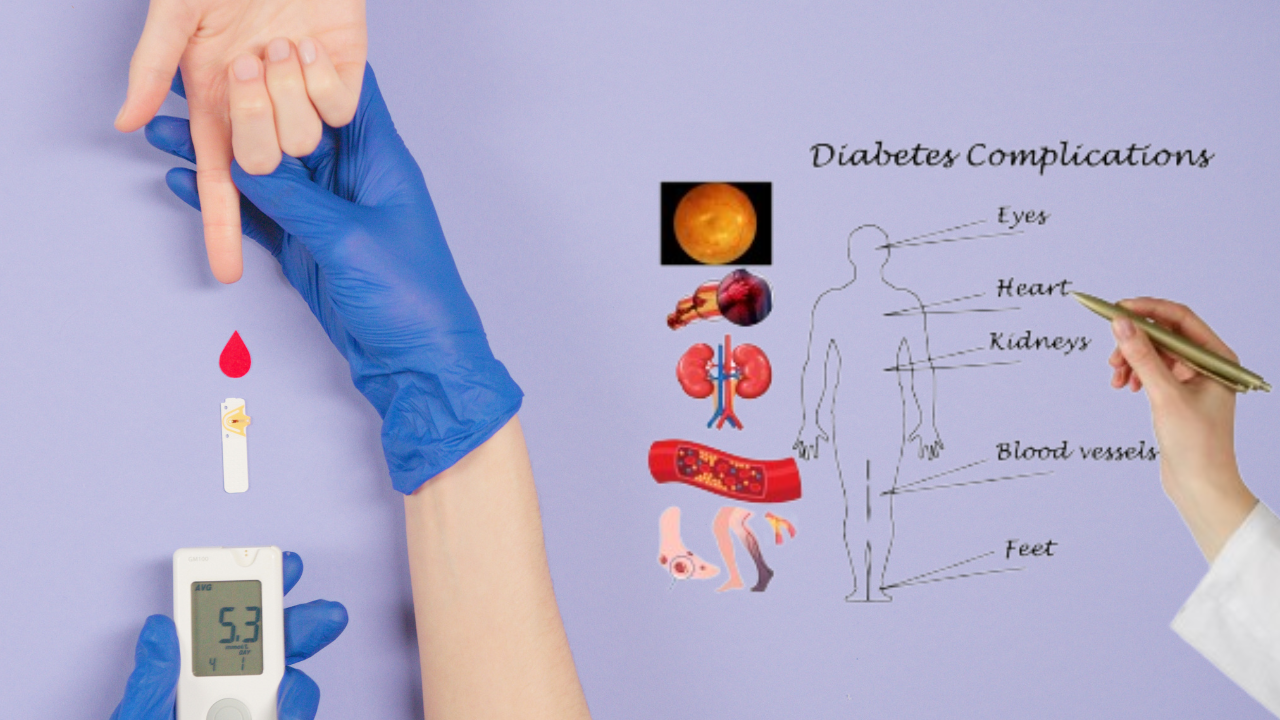“An ounce of prevention is worth a pound of cure” – Benjamin Franklin
Living with diabetes can be challenging & distressing but managing it well can significantly reduce the risk of complications. Diabetes complications—such as heart disease, nerve damage, kidney issues, or vision problems—can develop when blood sugar levels are not well-controlled. The good news is these complications are largely preventable (nearly 80% of complications can be prevented) with the right steps. In this blog, I will walk you through practical strategies to help you take control of your health and prevent diabetes complications.
Understanding the Risks of Diabetes Complications
Diabetes affects many parts of the body. If blood sugar levels remain high over time, they can damage blood vessels and nerves, leading to complications such as:
- Cardiovascular diseases: Increased risk of heart attacks and strokes.
- Neuropathy: Nerve damage that may cause pain, tingling, or numbness, and loss of protective sensations, especially in the legs and feet.
- Kidney damage (nephropathy): Potential kidney failure in severe cases. Diabetes is the commonest cause of chronic kidney disease worldwide.
- Eye damage (retinopathy): Increased risk of blindness or vision loss.
- Foot problems: Ulcers and infections that can lead to amputation if untreated.
While this might sound overwhelming, taking small but consistent steps can drastically reduce these risks.
Top Tips to Prevent Diabetes Complications
1. Control Your Blood Sugar Levels
Keeping blood sugar levels within the target range is the most critical factor in preventing complications.
- Monitor your blood sugar regularly using a glucometer or CGM (Continuous Glucose Monitoring System).
- Follow your doctor’s guidance on medications or insulin therapy.
- Aim for an HbA1c level of 7% or lower (as advised by your healthcare provider).
2. Control Your Blood Pressure & Lipids (Cholesterol)
Besides controlling blood sugar levels, It is mandatory to control Blood Pressure (<130/80mm) and Cholesterol levels (please check you desired target levels with your treating physician) to prevent diabetes complications.
3. Adopt a Balanced Diet
Your food choices play a major role in managing diabetes.
- Focus on high-fiber foods like vegetables, whole grains, and legumes.
- Limit processed foods, sugary drinks, and refined carbs.
- Include healthy fats, such as avocado, nuts, and olive oil.
- Practice portion control and consider consulting a dietitian for a personalized meal plan.
3. Stay Physically Active
Exercise helps lower blood sugar levels, improve insulin sensitivity, and support heart health.
- Aim for at least 150 minutes of moderate aerobic activity per week (e.g., walking, cycling, swimming).
- Incorporate strength training exercises twice a week to build muscle and improve metabolism.
- Start slowly if you’re new to exercise and gradually increase intensity.
4. Maintain Healthy Weight
Being overweight can worsen insulin resistance and blood sugar control. Losing even a small amount of weight (5-10% of your body weight) can make a big difference in your health.
5. Prioritize Regular Check-Ups
Early detection of any changes in your health is key to preventing complications.
- Schedule routine visits with your healthcare provider.
- Get annual screenings for eyes, kidneys, and feet.
- Monitor your blood pressure and cholesterol levels.
6. Quit Smoking and Limit Alcohol
- Smoking: Increases the risk of heart disease, neuropathy, and other complications. Quitting smoking can greatly improve your overall health.
- Alcohol: Consume in moderation and check how it affects your blood sugar levels.
7. Manage Stress
Chronic stress can raise blood sugar levels up to 30%. Practice stress-reducing techniques such as:
- Meditation or deep breathing exercises.
- Spending time in nature.
- Engaging in hobbies or activities that bring you joy.
8. Take Care of Your Feet
Diabetes can reduce circulation to your extremities, increasing the risk of infections and ulcers.
- Inspect your feet daily for cuts, blisters, or redness.
- Keep your feet clean and moisturized but avoid applying lotion between the toes.
- Wear comfortable, well-fitted shoes.
Myths About Diabetes Complications
- Myth: If I take insulin or medications, I can eat anything.
Truth: Medication supports your efforts but doesn’t replace the need for healthy eating and lifestyle changes. - Myth: Complications are inevitable if I have diabetes.
Truth: With proper management, many people with diabetes live complication-free for decades.
Small Changes, Big Results
Preventing diabetes complications isn’t about perfectionists about progress. Even small, consistent changes in your lifestyle can lead to significant improvements in your health. Take it one day at a time. Build habits that work for you. Stay proactive with your healthcare team and never hesitate to ask for support.
FAQs About Preventing Diabetes Complications
Q: How often should I get my eyes checked if I have diabetes?
A: You should have a comprehensive eye exam at least once a year to check for diabetic retinopathy and other issues.
Q: Can I reverse nerve damage caused by diabetes?
A: While nerve damage may not always be reversible, managing your blood sugar levels and taking prescribed treatments can prevent further damage and improve symptoms.
Q: Are there specific foods to avoid?
A: Limit sugary foods, trans fats, processed snacks, and high-carb items with low nutritional value. Focus on whole, nutrient-dense foods instead.
ABC…. of Diabetes Management
A- HbA1c- <7% (in some <6.5%)
B- Blood Pressure- <130/80 mm
C- Cholesterol- LDL- <55 or 70 or 100mg% (As per risk), HDL >40mg% in Male & >50mg% in Female
D- Diet – Healthy & Balanced
E- Exercise – FAR (Flexibility, Aerobics and Strength Training) , at least 150mints per week
F- Follow up with treating doctor
By following these tips, you’re not just preventing complications, you’re improving your overall quality of life. Remember, every positive step you take today leads to a healthier tomorrow. Practice holistic approach to managing diabetes and diabetes management is much more than just controlling blood sugar levels.
Ready to take control of your diabetes? Share your journey with us in the comments below or reach out for support!






1 comment
Aaqib
The blog was much informative and useful, thanks Dr. Kumar
Comments are closed.